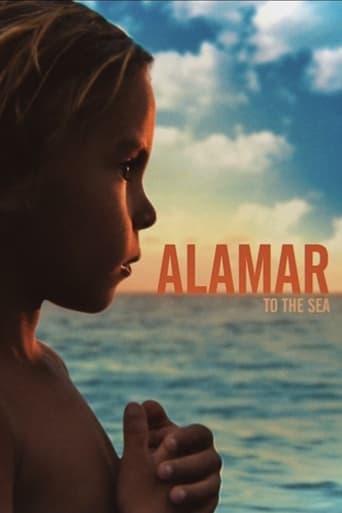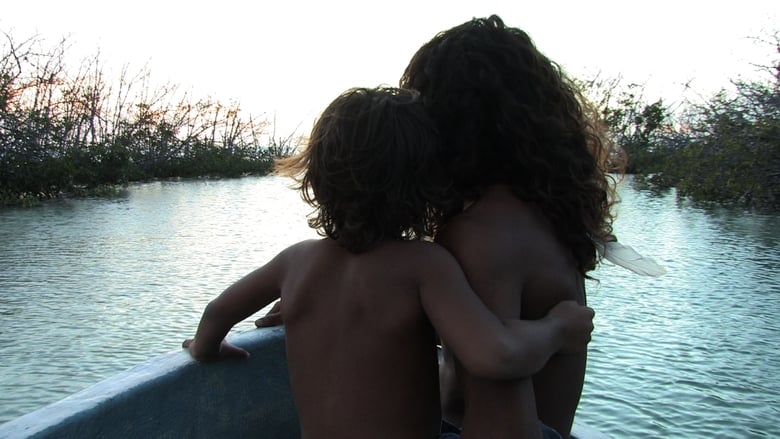

To the Sea (2010)
Before leaving for Rome with his mother, five year old Natan is taken by his father, Jorge, on an epic journey to the pristine Chinchorro reef off the coast of Mexico. As they fish, swim, and sail the turquoise waters of the open sea, Natan discovers the beauty of his Mayan heritage and learns to live in harmony with life above and below the surface, as the bond between father and son grows stronger before their inevitable farewell.
Watch Trailer
Cast
Similar titles
Reviews
Simply A Masterpiece
If you don't like this, we can't be friends.
hyped garbage
Great Film overall
Enjoyed this totally relaxed presentation of REAL reality life. The kid, the Dad and Grandpa were great, just being themselves, but an Academy Award should go to the camera person, and to the bird (as a best supporting actress). Could almost smell that seafood stew, yum. Rome looked pretty boring by comparison!
«Alamar» is a film about difference, cultural difference, different points of view, and different approaches to life. It is also a film about education, learning the simple principles on which humankind rests upon, learning the beauty of nature and its manifestations. Combining both concepts, «Alamar» is also a film about a different education, that necessary complement to schooling we have been deprived of, as lost as we are in modernity, urban settings and artificial life styles. Every sequence in the movie consists of lessons of life and nature a Mexican father gives to his little son, born from a romance with an Italian woman and who is about to move to Europe with his mama. Little Natan goes where his father Jorge lives in Banco Chinchorro, the second largest coral reef on planet Earth. Fishing, swimming, diving, learning about species of plants and animals, eating fresh sea food (which tastes so good and different from that flavorless frozen sea stuff we buy in supermarkets), all that is lived and learnt from his father and his surrogate grandfather. The sequence involving the African egret they call Blanquita is quite revealing of Jorge's persona: he teaches young Natan how to approach and "befriend" a wild animal. Jorge seems so in atonement with nature that animals are not afraid of him, as also seen in a deleted scene with a hermit crab. Without a plot full of gimmicks to keep our attention and just with an invitation to sit and watch, «Alamar» is a highly recommendable, moving and fascinating observational documentary.
"Alamar" (2009) is directed, produced, filmed and edited by Pedro González-Rubio. In the film a young boy Natan spends some time with his father Jorge and grandfather Nestór before going to Italy with his mother. Natan and his father journey into the open waters and live in a small shack on the water in a secluded fishing village on the coast of Mexico. Natan is a bit uneasy at first about spending time with his father, but quickly grows accustom to the simple life of a fisherman. Everything about life in this village is so pure and calming – from the magnificent blue waters to the hammocks hanging in the small wooden shack that they live in. Father and son take time just being together and forming a relationship.The acting was superb and little Natan was super cute. Watching this movie was soothing and I really didn't want it to end. There wasn't a lot of action and the scenes were often a bit drawn out, but it was like watching real life. The one scene where they try to get Blanquita to jump onto Natan's hand is simple and beautiful – I could have watched that for half and hour.
The unconditional love of a father for his young son is paramount in Pedro Gonzales-Rubio's cinematic tone poem, Alamar, a lyrical film of rare natural beauty. Set in the Banco Chinchorro, the largest atoll in Mexico and the habitat of hundreds of different species, director Rubio's 73-minute part fiction and part documentary film is imbued with a love of the sea and respect for the environment. According to the director, "By photographing and developing a story based on the current relation between man and his habitat in Chinchorro (declared in 1996 a Natural Reserve of the Biosphere by UNESCO), I intend to portray my love for this region and the admiration and respect I have towards the lives of its fishermen." Though the young boy, Natan (Natan Machado Palombini), will soon leave for Rome, Italy to live with his Italian mother Roberta (Roberta Palombini), she agrees to let him spend time with his father Jorge (Jorge Machado), a spear fisherman, but it will not be for an extended stay. "We'll be gone for a while, and when we come back, you'll go with Mommy," he tells Natan sadly. Jorge lives with his own father, Matraca (Nestor Martin), in a house built on stilts in the middle of the water and their simple life is in harmony with nature. Together they show the young boy the way to reel in a fish, how to spear lobster and barracudas, and how to scale and clean fish for consumption.Initially seasick, Jorge holds Natan lovingly until his sickness disappears and they are free to navigate the luminous blue-green waters. Together, Jorge, Natan, and Matraca dive under the water where, according to a travel guide for the Costa Maya region of Mexico, "the diving is spectacular with large blue sponges, many fish, turtles, sea walls full of life, and a clear sunlit scenario that includes many sunken ships." What soon becomes evident, beyond the simple satisfaction in life that they experience, is the bond between Jorge and Natan that develops between sleeping in hammocks, drinking strong coffee, and engaging in playful wrestling matches. Natan's new world is far from the challenges of living in a big city. Here there are no I-pods, cell phones, or high-definition TV, only the stark beauty of unspoiled nature.Important lessons about life are also learned. Natan has his first experience of loss and impermanence when the white bird they named Blanquita which they have been feeding every day, suddenly disappears. Alamar is a hypnotic and poetic film that is a welcome change from the never-ending assembly line of films about social dysfunction of one kind or another. An ode to fatherly love, it is a poignant reminder of the phrase of the Roman poet Ovid who said, "Everything changes, nothing dies." Joy turns to tears, which again turns to joy in an endless cycle, yet, though circumstances change, love is a constant that endures.



